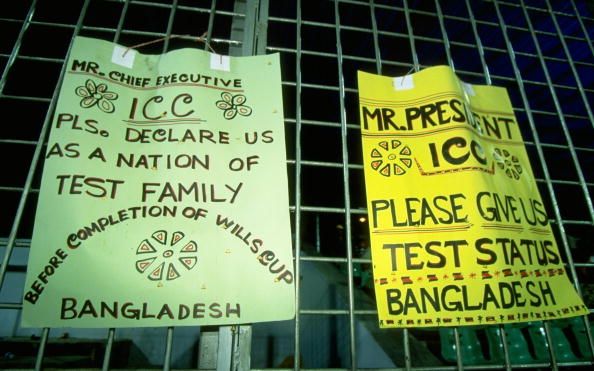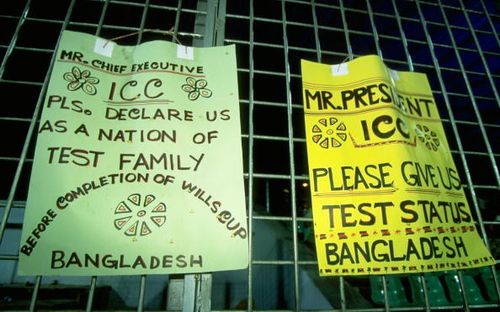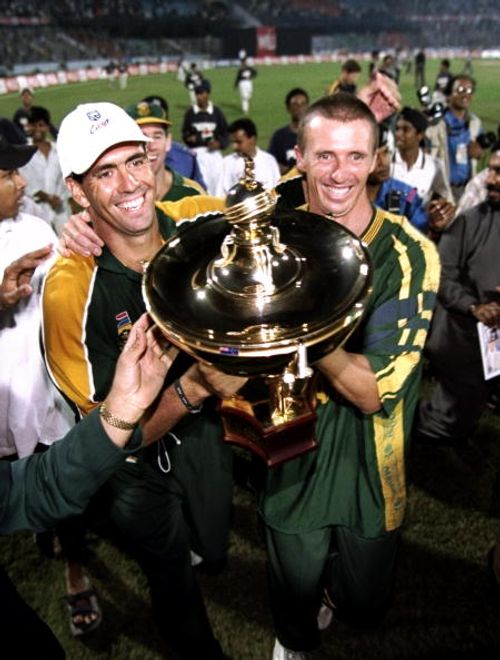
ICC Champions Trophy origins: 1998

After the conclusion of the showpiece that is the Indian Premier League, it is time to switch focus to the second shortest format of cricket – One Day Internationals (ODIs). With the advent of Twenty20, ODIs – which comprise 50 overs – do seem a tad boring to the new generation of fans that has sprouted around the world. Even so, this format has seen so many momentous occasions that it is almost impossible to imagine life without this avatar – thanks to Kerry Packer.
One of the historic occasions in this format was the conception of a short cricket tournament by the ICC in 1998 in order to raise funds for the development of cricket in the non-Test playing nations. It was dubbed as the Mini World Cup (and later officially renamed as the Wills International Cup) since all full members of the ICC were involved. A key aspect of this tournament was that it was planned as a knock-out competition, so that it was short and did not take away the sheen of the quadrennial World Cup tournament.
Since the entire contest was conceived for the benefit of non-Test playing countries, it was only fitting that the host country would be one of them, and Bangladesh was awarded that honour. Initially, it was announced that all nine ICC member nations would be ranked according to the seedings of the recently-concluded 1996 World Cup, meaning two teams had to play a qualifier to determine the final set of eight teams that would eventually play in the tournament. These two teams turned out to be New Zealand and Zimbabwe, and the tourney took off with a knockout qualifier between them.
On October 24, 1998, the Mini World Cup took off, with Kiwi pacer Simon Doull delivering the first ever legal ball of the tournament. This pre-quarter Final saw a wonderful century from Zimbabwe captain Alistair Campbell and a composed knock of 77 from veteran wicket-keeper batsman Andy Flower. NZ left-arm seamer Geoff Allott picked up three key wickets to restrict the opposition to 258/7. Kiwi captain Stephen Fleming led a remarkable fightback with a brilliant 96, but it was all-rounder Chris Harris and pacer Alex Tait who scored the remaining 14 runs off the last over bowled by a wayward Neil Johnson – Harris hitting the winning boundary that sent the Zimbabweans packing. A thriller to say the least.
While the first couple of games had the captains performing extremely well for their sides, the match of October 28 changed that trend. The reason? Sachin Ramesh Tendulkar was on the prowl. Though the game was a record 300th appearance in ODIs for Indian captain Mohammad Azharuddin, it was the Little Master who stole the show with a rampaging 141 and a four-wicket haul against the mighty Australians. In reply to India’s mammoth 307/8, the Aussies collapsed for 263, with opener Mark Waugh delivering a fitting riposte with his knock of 74 off 79 balls and future skipper Ricky Ponting scoring 41.
As the tournament entered its final stages, there were some memorable performances from many players. Notable among them include SL skipper Arjuna Ranatunga’s magnificent unbeaten 90 against the high-flying Kiwis, West Indies opener Philo Wallace’s power-packed, match-winning 79 against Pakistan – the list is endless. In the process, the competition registered its first four semi-finalists in South Africa, West Indies, India and Sri Lanka.
Both the penultimate games turned out to be lopsided encounters. Young pacer Mervyn Dillon wrecked the Indian batting lineup with his fast deliveries, and only Sourav Ganguly (83) & all-rounder Robin Singh (73*) were able to offer any resistance. In reply, the crowd were treated to a vintage performance from southpaws and WI stalwarts Shivnarine Chanderpaul (74) & captain Brian Lara (60*). India, in quest of a major tournament title since winning the World Cup in 1983, were thus knocked out.
The other semi-final witnessed a magnificent century from the young all-rounder Jacques Kallis as he helped the Proteas to a decent score of 240 in 39 overs. Fast bowler Steve Elworthy then unleashed a magnificent display as he snared 3 important wickets – Sanath Jayasuriya, Romesh Kaluwitharana and Aravinda de Silva – as the Emerald Islanders collapsed for 132. Pat Symcox, the 38-year old off-spinner, also took out three Lankan batsmen and assisted in his side’s entry into the finals.
The final also belonged to Kallis as he picked up a five-wicket haul to restrict the Caribbean side to 245, despite opener Wallace’s blazing hundred. Captain Hansie Cronje, who would soon fall into disgrace, scored an unbeaten 61, and along with decent contributions from Kallis and Mike Rindel, pulled off the win, thus securing the first ever major title for his country. For the Proteas, it was a moment to cherish forever, as they were outdone by Lara’s brilliance in the 1996 World Cup. It was also the beginning of Kallis’s golden period as he became one of the lynch-pins of the South African line up.

The entire sporting event witnessed the final flourishes in the careers of players such as Keith Arthurton, Philo Wallace, Daryll Cullinan, Mike Rindel etc. It also saw the emergence of players such as Rahul Dravid, Sourav Ganguly and Nuwan Zoysa in the ODI arena. The ICC Mini World Cup achieved its objective of promoting the game in Bangladesh, as the host nation went on to become a member of the ICC and caused major upsets in subsequent multi-nation tournaments. It set the platform for the debut of many future international stars, and was so successful that cricket’s governing body announced that it would be played every two years. After Kerry Packer’s World Series Cricket, the ICC Mini World Cup (re-christened as the Champions Trophy) has been yet another golden chapter in the history of cricket. The saga continues.